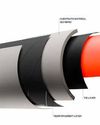
MONOETHYLENE Glycol (MEG) is widely used as a dehydration agent in the natural gas industry. In the MEG regeneration process, centrifuge equipment is commonly used to separate salts from the MEG solution.
However, salts settlement can cause significant issues with the efficiency of the centrifuge equipment.
The MEG regeneration process involves several steps aimed at obtaining lean MEG form the rich MEG stream.
Rich MEG is typically received in the MEG regeneration unit from the plant slug catchers and inlet separators. This liquid feed generally contains some dissolved hydrocarbons, CO2, salts and solids.
Filtration removes solid particles and floating impurities from the MEG solution. Degassing and thermal processes leave a stream with concentrated salts.
The separation of the salts from the MEG solution is usually referred to as reclamation. The slurry stream produced in the reclamation is typically fed to a centrifuge to produce a salt cake.
“Centrifugation is the most efficient method for separating salts and impurities from the MEG solution during the regeneration process and is included to enhance the level of recovery of glycol,” a research study by Turki Alghamdi, Planning and Performance Management Analyst, Saudi Aramco, Khaled Aljuhany, Project Engineer, Saudi Aramco, and Pietro Scoppetta shows.
CENTRIFUGATION
During centrifugation, centrifugal force is applied to the slurry that has been obtained by processing of the contaminated MEG solution, causing heavier particles to separate and settle at the bottom of the equipment.
The purified MEG is then recovered along with the regenerated MEG, leaving the separated impurities to be removed later.
This story is from the October 2024 edition of Oil and Gas News.
Start your 7-day Magzter GOLD free trial to access thousands of curated premium stories, and 9,000+ magazines and newspapers.
Already a subscriber ? Sign In
This story is from the October 2024 edition of Oil and Gas News.
Start your 7-day Magzter GOLD free trial to access thousands of curated premium stories, and 9,000+ magazines and newspapers.
Already a subscriber? Sign In

Ocean light pollution has been invisible for too long
Scientists increasingly understand the damage done by artificial light and action is needed now, says Thomas Davies of the Global Ocean Artificial Light at Night Network

NSK tapered roller bearings selected for wind turbines
EUROPEAN wind turbine manufacturer NSK is set to use high-load-capacity tapered roller bearings in its 15 MW class offshore wind turbines.

Syensqo launches extrudable PPS for sustainable piping
SYENSQO has introduced Ryton PPS XE-5000NA, the first grade of an innovative extrudable polyphenylene sulfide (PPS) technology.

Aspen Technology launches Microgrid Management System
ASPEN Technology has introduced the AspenTech Microgrid Management System (MMS), a solution for heavy electrical power requirements in industries like refining, chemicals, and mining.

Adnoc Gas uses 3D printing for replacement parts
ADNOC Gas has developed a digital library of critical components for the energy industry, which can be manufactured on demand using advanced 3D printing technology.

Africa's O&G growth offers logistics opportunities
THE African Export-Import Bank has signed a $162.9 million financing agreement with port infrastructure firm APD-Cameroon to support the construction of a $232.8 million port terminal in Douala in June 2024.

APPO chief urges African unity against EU carbon tax
DR Omar Farouk Ibrahim, Secretary General of the African Petroleum Producers Organisation (APPO), delivered a powerful message at the AOW - Investing in African Energy conference, calling for a unified African front in the global energy landscape and warning against the detrimental effects of the European Union's planned carbon border adjustment mechanism (CBAM).

UNOC to develop East African Crude Oil Pipeline
THE Uganda National Oil Company (UNOC), in partnership with TotalEnergies, CNOOC, and the Tanzania Petroleum Development Corporation, is leading the development of the East African Crude Oil Pipeline (EACOP), a 1,443km infrastructure project linking Uganda's Tilenga and Kingfisher oilfields to Tanzania's Port of Tanga.

Angola to award 15 new concessions by year-end
THE National Oil, Gas & Biofuels Agency (ANPG) – Angola’s concession aire and regulator – announced that 15 new concessions will be awarded in Angola before the end of 2024.

Rosatom accelerates African nuclear development
ROSATOM, Russia's state-owned nuclear corporation, is accelerating African nuclear development by supporting the construction of nuclear energy facilities, capacity building, mining activities, and regulatory support.